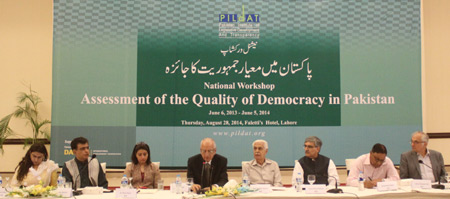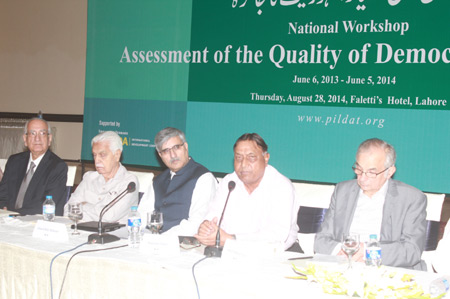|
|
| |
| EVENTS |
|
|
> Resolution of Political Issues must within the Constitutional Framework
|
|
|
| |
Lahore, August 28, 2014; Constitutional framework has to be the basis of resolution of all political issues, and any tinkering with Democracy will be fatal for the country, believed participants at a PILDAT Citizens Forum on Quality of Democracy in Pakistan. |
|
| |
The Forum was held to ascertain public perceptions on current political crisis and quality of Democracy in Pakistan.
|
|
| |
With Mr. Shahid Hamid, Former Governor Punjab, as the Chair, those who joined the forum included Dr. Huma Baqai, Chairperson, Department of Social Sciences, Institute of Business Administration (IBA); Lt. Gen. (Retd.) Moinuddin Haider, Former Governor, Sindh and former Federal Minister for Interior; Mr. S. M. Zafar, former Senator and Senior Advocate, Supreme Court; Dr. Niaz Murtaza, Political Economy and Development Specialist; Mr. Mujib-ur-Rehman Shami, Editor in Chief, Daily Pakistan; Mr. Ilahi Bukhsh Soomro, Former Speaker, National Assembly of Pakistan; Mr. Ashraf Jahangir Qazi, Former Ambassador of Pakistan; Mr. Ahmed Bilal Mehboob, President, PILDAT and Ms. Aasiya Riaz, Joint Director, PILDAT. |
|
| |
Denouncing the call for Civil Disobedience by Mr. Imran Khan as unconstitutional, Mr. Shahid Hamid traced history by sharing that Mr. Jinnah left All India Congress when it passed a resolution for Civil Disobedience and termed it against the Constitution. He also said that the call is against the Article 260 of the Constitution which enjoins upon each citizen to maintain the safety, stability, welfare and integrity of Pakistan. |
|
| |
Opining on the demand of resignation of Prime Minister Mr. Muhammad Nawaz Sharif, Mr. Shahid Hamid also termed it unconstitutional. He stated that unless the Prime Minister voluntarily resigns, he cannot be forced out by a few Generals, as in 1999, or by a few thousand people as in Islamabad today. He, however, offered that as per Prime Minister's Salary, Allowance and Privileges Act, 1975, the Prime Minister can avail a leave of up to 3 months which would be conducive to defusing the current political deadlock. |
|
| |
Lt. Gen. (Retd.) Moinuddin Haider, former Governor Sindh and former Interior Minister, said that the General Election 2013 were largely free and fair without any systematic rigging, as PILDAT had assessed back in May 2013. He however said that local incidents of aberrations could not be denied. He believed that continuity of Democracy is the only way forward for Pakistan; however, dividends of Democracy in terms of better Governance should also reach the public. |
|
| |
Speaking on the occasion, Mr. Mujib-ur-Rehman Shami said that while that those protesting on the streets of the Islamabad might have genuine grievances, the issues must be resolved by staying within the political process. He warned against undermining the power of the vote and the Constitution by the attempts to overthrow an elected Government through public sit-ins and demonstrations. He stated that if the Constitution is undermined, the country would have to pay a very heavy price in the future. He said that in the sport of cricket, a small violation can lead to a player being banned for life, whereas the disregard for Constitution does not seem to have any repercussions of the similar sort. |
|
| |
Mr. Ashraf Jehangir Kazi, a former Ambassador, said that Pakistan's democracy has key flaws that must be resolved before expecting its strengthening. He believed that only the strengthening of the Pakistan�s governance system could contribute significantly towards strengthening the democratic process. |
|
| |
Dr. Niaz Murtaza said that better democracy could only be achieved through a continuation of the system and a manifestation of patience by all the stakeholders. He said that revolutions could never immediately lead to good governance but the strengthening of the democratic processes and a patient adherence to them could.
3 tiers of Democracy including National, Provincial and Local Government are necessary for the success of Democracy, believed Mr. Azam Nazeer Tarar, Member Pakistan Bar Council from Punjab. Lamenting low rate of criminal conviction hovering between 7% and 9%, he said that how can Pakistan's governance improve when criminals are almost certain of not being convicted.
Vice Chairman and Members of Pakistan Bar Council, President Lahore High Court Bar, Members of the Youth Parliament, Academia and Media participated in the Dialogue on developments in democracy. Participants generally believed the current conflict should be resolved through political dialogue. |
|
| |
|
|
| |

|
|
| |
|
|
| |

|
|
|
|
|
|
|
|
|